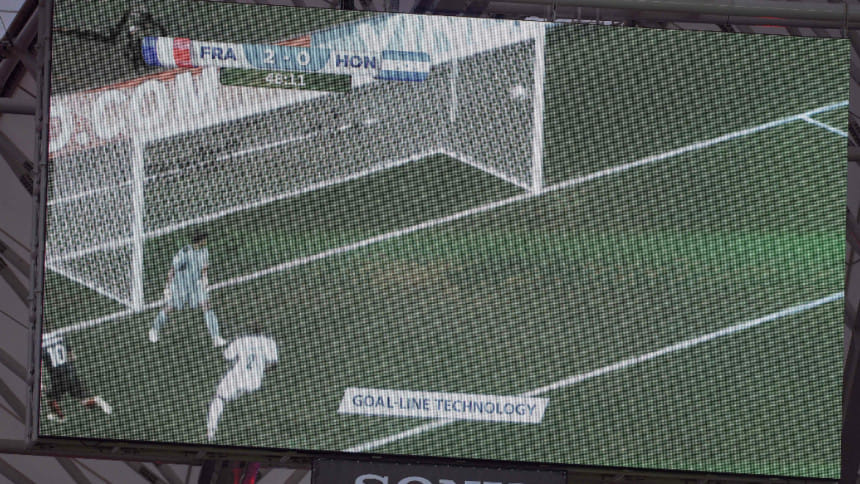French glitches put technology under review

The debate on using technology to help football referees took a twist on Thursday as the French league suspended its use of goal-line reviews following some "serious dysfunctions".
The goal-line technology (GLT) system, provided by German company GoalControl, was "suspended immediately" by French football authorities after incidents in League Cup games on Wednesday between Amiens and Paris Saint-Germain and Angers and Montpellier.
In Amiens, the problem centred around PSG's second goal in a 2-0 victory. Adrien Rabiot's flicked header hit the post and bounced over the line before goalkeeper Jean-Christophe Bouet pulled the ball back. However "the GLT did not make the referee's watch vibrate", Didier Quillot, the director general of the French league said in a conference call on Thursday.
In the second incident, which involved Montpellier defender Daniel Congre, the problem was the reverse. The technology "made the referee's watch vibrate in error even though the ball taken by Daniel Congre passed far from the goal line".
"These two anomalies are unacceptable," Quillot said.
Unlike the Video Assistant Referee (VAR), which is being tried this season in the Bundesliga and Serie A and has been used for the first time in England in cup games in recent weeks, and involves an extra official watching replays, GLT is supposed to respond automatically when the ball crosses the goal line between the posts.
In October, Suzana Castaignede, a former GoalControl employee, told French media that the system did not always function automatically and that sometimes human operators had to intervene and make the referee's watch vibrate after the ball had crossed the line.
On Thursday, the French league signalled it might cancel the contract with GoalControl which is due to run until 2019 and turn instead to its costlier British competitor Hawk-Eye which supplies Serie A, the Premier League and the Bundesliga.
"The technology has to work," said Quillot. "That's not the case with the first-generation that is being delivered by GoalControl."
Perhaps France has reasons to look kindly on GoalControl. The company provided the GLT which was used at the World Cup in Brazil in 2014. It awarded one goal: scored by France against Honduras.
Ferocious debate over GLT and VAR
These French hiccups come as the debate over technological assistance for referees, whether it is GLT or VAR, is being ferociously debated.
For the coming World Cup in Russia, FIFA will again rely on GLT but has not yet decided whether to use VAR, though the governing body of world football has indicated that it would like to in four cases: goals, penalties, straight red cards and mistaken identity.
The experiments with VAR in Germany and Italy are meeting with resistance.
In Italy, Lazio fans launched a legal action on December 20 against the referee and video assistant who they say are to blame for two errors that caused their club to lose 3-1 at home to Torino nine days earlier.
In Germany, the Bundesliga boasted that in the first half of the season VAR helped prevent 37 potential result-changing wrong decisions. Yet in November, ex-referee Hellmut Krug, head of the Bundesliga's VAR centre in Cologne, was replaced amid accusations that he influenced decisions to favour Schalke, the club he supports.
This week, in a survey published in Kicker magazine, 47 per cent of German professional players said they wanted VAR done away with while only 42 per cent wanted to keep it (the other 11 per cent had no opinion).
In November, Germany internationals Sandro Wagner and Sami Khedira agreed they liked the theory of VAR but not the implementation.
"We have to wait two minutes to get a decision and despite the video, too many mistakes are still being made," Wagner said.
Khedira made a point that was echoed by Rabiot after his goal on Wednesday was not immediately given.
"The players do not know anymore whether or not to celebrate after a goal," Khedira said. "A lot of emotion and passion has been lost."
In England, VAR made its debut on Monday as Brighton beat Crystal Palace in the FA Cup with an 87th-minute goal by Glenn Murray. At the final whistle, Palace players were still complaining to referee Andre Marriner that the goal should have been disallowed either by him or by video assistant Neil Swarbrick.
"The people close to it seemed to be incensed, and from our angle it looks as if he's guided the ball in with his arm," Palace manager Roy Hodgson said before adding that the replays had changed his mind.
"When you watch it lots of times like they've been able to do, from different angles, it would have been very harsh" to disallow it.
"It was a genuine goal."

 For all latest news, follow The Daily Star's Google News channel.
For all latest news, follow The Daily Star's Google News channel. 








Comments